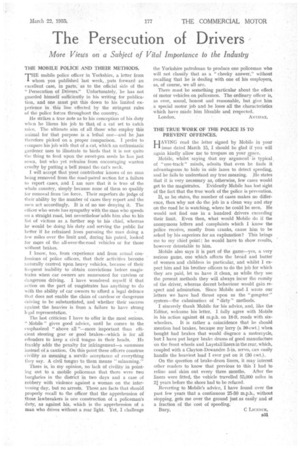The Persecution of Drivers
Page 45

If you've noticed an error in this article please click here to report it so we can fix it.
More Views on a Subject of Vital Importance to the Industry
THE MOBILE POLICE AND THEIR METHODS.
THE mobile police officer in Yorkshire, a letter from whom you .published last week„ puts forward' an excellent case, in parts, as to the official side of the
Persecution of Drivers." Unfortunately, he has not guarded himself sufficiently in his writing for publication, and one must put this down to his limited experience in this line effected by the stringent rules of the police forces throughout the country.
He strikes a true note as to his conception of his duty whcn he likens his job to that of a cat set to 'catch mice. The ultimate aim of all those who employ this animal for that purpose is a lethal one—and he bas therefore picked on a proper Comparison. I prefer to compare his job with that of a cat, which an enthusiastic gardener uses to illustrate to birds that it is not quite the thing to feed upon the sweet-pea seeds he has just sown, but who yet refrains from encouraging wanton cruelty by putting a bell round the cat's neck.
I will accept that your contributor knows of no man being removed from the road-patrol section for a failure to report cases, and I am sure that it is true of the whole country, simply because none of them so qualify for removal from the force. Their superiors do judge of their ability by the number of cases they report and the men act accordingly. It is of no use denying it. The officer who wrote has sympathy with the man who speeds on a straight road, but nevertheless/adds him also to his list of victims as a further sop to his chief, whereas• he would be doing his duty and serving the public far better if he refrained from pursuing the man doing a few miles over the limit and, during his patrol, looked for more of the all-over-the-road vehicles or for those without brakes.
I know, too, from experience and from actual confession3 of police officers, that their activities becorke naturally centred upon heavy vehicles, because of their frequent inability to obtain convictions before magistrates when car owners are summoned for careless or dangerous driving. I have wondered myself if that action on the part of magistrates has anything to do with the ability of car owners to afford a legal defence 1 hat does not enable the claim of careless or dangerous driving to be substantiated, and whether their success against the heavies is from a failure to have strong h:gal representation.
The last criticism I have to offer is the most serious. "
Mobile" gives 'good advice, until he comes to the emphasized "above all "—more .important than efficient steering gear or good brakes—which is for all offenders to keep a civil tongue in their heads. He frankly adds the penalty for infringement—a summons instead• of a caution. On this point these officers construe civility as meaning a servile acceptance of everything they say. A civil tongue to them means "salaaming."
There is, in my opinion, no lack of civility in pointing out to a mobile policeman that there were two burglaries in the district in two days and a case of robbery with violence against a woman on the intervening day; but no arrests. Those are facts that should properly recall to the officer that the apprehension of those lawbreakers is one construction of a policeman's elutY; as against his, which is the apprehension of a man who drives without a rear light. Yet, I challenge
the Yorkshire patrolman to produce one policeman who will not classify that as a "cheeky answer," without recalling that he is dealing with one of his employers, as, of course, we all are.
There mast be something particular about the effect of motor vehicles on policemen. The ordinary officer is, as ever, sound, honest and reasonable, but give him a special motor job and he loses all the characteristics which have made him likeable and respected.
London. ANTIPAT.




























































































